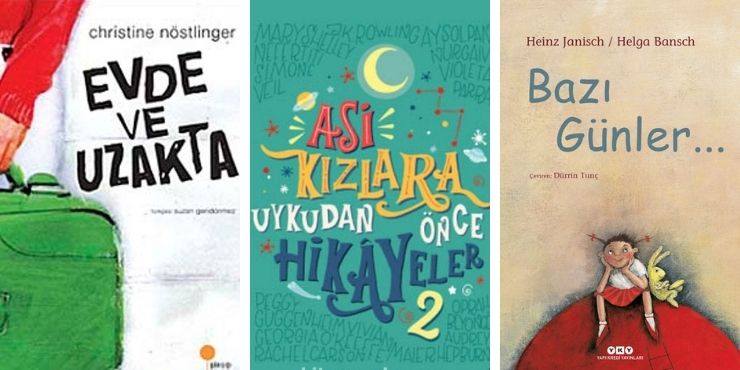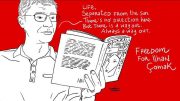According to the decision of the Board for the Protection of Minors from Obscene Publications of the Ministry of Family, Labor and Social Services published in the Official Gazette on 22 November 2020, three books have been deemed “obscene”.
The Board decided, unanimously, that certain expressions in the books were capable of having a negative effect on the spiritual well-being and development of minors; therefore, the books in question had to be subject to the restrictions set forth in article four of the Law No. 1117.
BOOKS DEEEMED “OBSCENE”
– The book Bazı Günler (There Are These Days), written by Heinz Janisch, illustrated by Helga Bansch and translated into Turkish by Dürrin Tunç; published by Yapı Kredi Kültür ve Sanat Yayıncılık, 1st edition in February 2017, 2nd edition in February 2019
– The book Evde ve Uzakta (Girl Missing), written by Christine Nöstlinger and translated into Turkish by Suzan Geridönmez; published by Günışığı Kitaplığı Yayıncılık, 1st edition in March 2011, 7th edition in March 2020
– The book Asi Kızlara Uyumadan Önce Hikayeler 2 (Good Night Stories for Rebel Girls 2), written by Francesca Cavallo and Elena Favilli, translated into Turkish by Deniz Öztok; published by Hep Kitap – Teas Yayıncılık in February 2018
Suzan Geridönmez, the translator of the book Evde ve Uzakta (Girl Missing), written by Christine Nöstlinger and published by Günışığı Kitaplığı reacted to the decision to declare the book obscene. Stating that putting the book she translated under restricted books category “is against freedom of thought and expression”, Geridönmez said “I consider this as a practice of systematic censorship that has been focusing mainly on children’s and youth publications and that has been increasing in size and coverage most recently”.
‘FREEDOM TO CHOOSE BELONGS TO THE FAMILY’
In a statement published at Evrensel, Geridönmez said “The author writes, the translator translates and the publisher publishes. They are all committed to their respective professional principles which are protected by their relevant professional organizations. Freedom of thought and expression means that adults decide for themselves what to read. And when children under 18 are in question, the freedom and responsibility to choose belongs to the family. Parents are free to make their children read books that are compatible with the Turkish and Islamic culture, just like they are free to make their children read books that build bridges between cultures and encourage critical thinking. Indeed, interference in this freedom means nothing but interference in personal rights and freedoms…”.
‘HER BOOKS ARE RECOMMENDED AT SCHOOLS’
Drawing attention to the fact that Christine Nöstlinger’s books are actually recommended in many schools attached to the Ministry of National Education and that children love to read them, Geridönmez continued “In the notification, the word obscene is defined as ‘against morals’, ‘vulgar’ and ‘filthy’. Before I talk about how I feel, I am rather curious about how the teachers and parents whose free choices have been deemed ‘filthy’ feel and how they will react. And certainly, how and when the publishers, who still maintain their silence with a ‘let the sleeping dogs lie’ mentality, but who also have so many publications in their publishing programs that could be censored any moment with the same shady justifications, will react all together and loudly to defend the freedom of thought and free art…”.
WHAT DOES ARTICLE FOUR OF LAW NO. 1117 ENTAIL?
Article 4 –”(provision of Law No. 1117 dated 21/6/1927.) The list of names of books, journals and the periodical issues thereof that are examined and deemed to have a harmful effect on the spiritual well-being of minors by the Board shall be submitted to the Ministry of Education.”
A copy of this list shall be sent from the Ministry of Education to the Ministry of Justice and thuswise communicated to the public prosecutors’ offices. Authors of the publications included in the list shall be notified by the highest-ranking civilian administrator’s office. Upon such notification, authors shall be obliged to mark the first page of the unsold copies in their possession with the “subject to restrictions” stamp. Publications stamped in this way:
- A) Cannot be sold in open display by fixed or mobile distributors,
- B) Cannot be displayed in stores or on windows.
- C) Cannot be transported openly from one location to another to be displayed; and orders for such publications cannot be received by distributors.
- D) Cannot be announced by newspapers or journals or through posters and pamphlets or any other means.
- H) Cannot be shown to minors by booksellers, given to them for free or in exchange of money and can by no means brought to schools.





